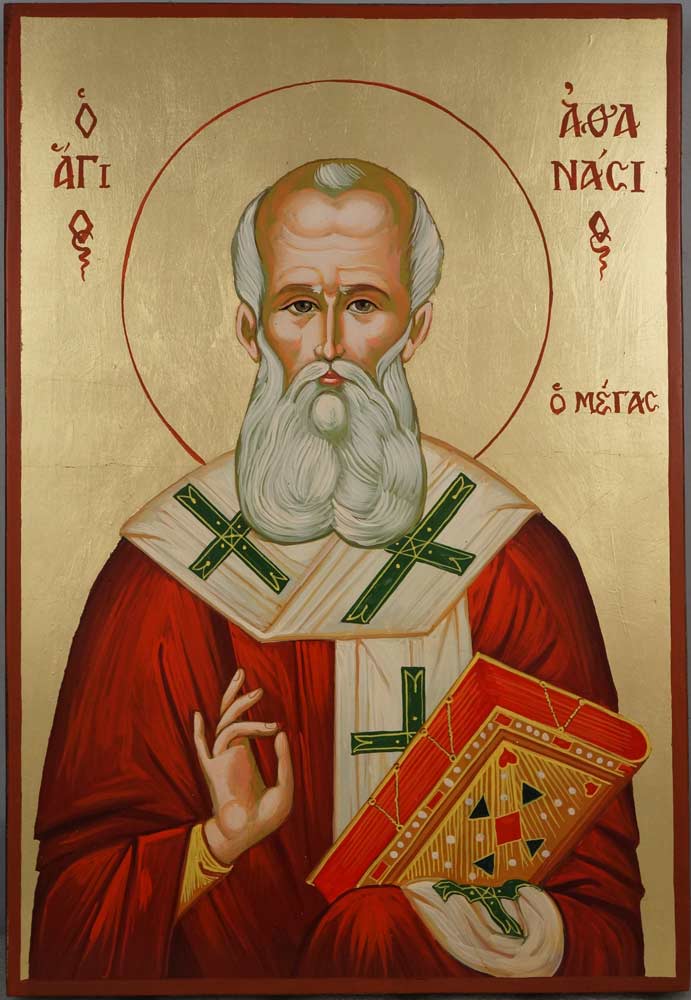
May 2
St. Athanasius of Alexandria
Life (295-373)
St. Athanasius of Alexandria has been called “the greatest man of his age and one of the greatest religious leaders of any age.” He was not called on to be a martyr to the truth; still he was persecuted for the truth to within an inch of his life. The truth involved in this case was the divinity of Christ. Around the year 323, Arius, a priest of Alexandria, began to teach that the Son of God is not himself God, but only the noblest of the Father’s creatures.
Reaction against this attack on the Holy Trinity was quick. In the year 325, the first ecumenical council in church history was held at Nicaea near Constantinople. It defined, in the profession of faith that we all recite each Sunday, that the Son is “one in being with the Father” - that is, equally divine. When this had been officially declared, Emperor Constantine ordered the exile of Arius and of those church leaders who had favored him.
Athanasius, a deacon of the important archdiocese of Alexandria, Egypt, had attended the Council of Nicaea with his bishop, and being a brilliant student, he had already shown a keen realization of why Arius was wrong. In 328, when he was only about thirty, Athanasius was named archbishop of Alexandria. Highly regarded by his people, he quickly showed his intention to eliminate all traces of Arianism.
Although Constantine had ejected the Arian leaders from the empire, he started readmitting them around 330. These Arians now set about to undo the definition of the Council of Nicaea. Since Athanasius stood bravely in their path, they realized they must first get him out of the way through pulling wires with the emperors. In 335 the Arian party engineered a condemnation of Athanasius. Constantine was hoodwinked into sending him into exile at Trier, Germany, where the archbishop remained for two years. Although he was able to return to Alexandria after the death of Constantine in 337, the saint was set upon again in 339, again deposed, and exiled from 339 to 346. He went to Rome during this period, and the pope defended him, but even the pope could not offset the vindictive Arian church leaders of the East.
Athanasius had been back in his see city for only seven years when the pro-Arian Emperor Constantius saw to it that he was condemned yet another time. This time the archbishop hid for six years among his friends, the monks of the Egyptian desert. Emperor Julian let him return home briefly in 363, but then ousted him again for almost a year. Back to the desert he went. His fifth and last exile came under Emperor Valens, 365-366. This time, he apparently hid out in a suburb of Alexandria. Allowed to return to his cathedral in 366, he spent the last seven years of his life at home, and had the consolation of dying in his own bed!
To be a hunted exile for seventeen years is no easy experience, but Archbishop Athanasius was a resilient, even a cheerful victim. Once during his exile of 362-363, he and some friends were in a boat on the Nile when they suddenly noticed that an imperial galley was bearing down on them. The archbishop at once told his steersman to turn the boat towards the official galley. When the two boats passed, somebody on the galley shouted, “We’re looking for Athanasius. Have you seen him?” Athanasius himself answered, “He’s ahead of you. Row fast!” The imperial galley sped forward. Athanasius and his friends then made straight for the shore and safety.
St. Athanasius is one of the four great doctors of the Eastern Church. The others are St. John Chrysostom, St. Basil the Great, and St. Gregory of Nazianzus. He left us marvelous writings on the dogma of the Trinity, and an example of Christian heroism that can thrill us even today. --Father Robert F. McNamara
Scripture (1 John 5:1-5)
you raised up your bishop Athanasius
as the great champion of your Son’s divinity;
grant us the joy of his teaching and protection,
that we may grow each day in knowledge and love of you.
We ask this through our Lord Jesus Christ, your Son,
who lives and reigns with you in the unity of the Holy Spirit,
God for ever and ever. Amen.